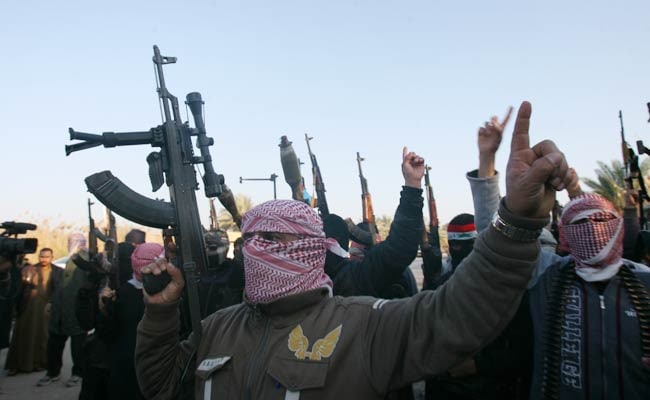
File Photo: A picture showing Islamic State militants. (Associated Press)
Baghdad:
Members of the Yazidi community, one of the Iraqi minorities hardest hit by jihadist atrocities, killed 21 Sunni Arab villagers in a January revenge attack, Amnesty International said today.
The London-based watchdog investigated attacks carried out on January 25 by a Yazidi militia in Jiri and Sibaya, two Sunni Arab villages in the Sinjar region of northern Iraq.
"Virtually not a single house was spared. Half of those killed were elderly or disabled men and women and children," Amnesty said in a report.
It said another 40 were abducted, 17 of whom are still missing.
Among other witnesses, Amnesty spoke to a father who lost two sons aged 15 and 20 in the attack. Their 12-year-old brother was shot four times in the back but survived.
"We could not imagine the assailants would target the old and the sick but they did," one man told Amnesty, describing how his 66-year-old father was shot dead in his wheelchair.
The Yazidis, a religious minority which lives mainly in Iraq's Sinjar region, are neither Muslims nor Arabs and follow a unique faith despised by the Islamic State jihadist group.
In 2014, IS jihadists massacred Yazidis, forced tens of thousands of them to flee, captured thousands of girls and women as spoils of war and used them as sex slaves.
The UN has said the atrocities committed against the small community may amount to genocide.
"It is deeply troubling to see members of the Yezidi community, who have suffered so much at the hands of the IS, now themselves committing such brutal crimes," Donatella Rovera, Amnesty's senior crisis advisor, said.
The rights group said some witnesses accused Kurdish security forces running the area of turning a blind eye.
The report, which included investigations into other sectarian massacres, was issued to coincide with the first anniversary of IS' massive offensive in Iraq.
Jihadist-led fighters took over around a third of Iraq last June, bringing it to the brink of collapse.
Violence has continued since as Iraqi government forces and a wide range of foreign allies have battled IS, so far failing to break the back of the jihadist group.
"Looking back at the carnage and chaos that has taken hold in the year since the IS takeover, the picture that emerges is of an Iraq more fractured and bitterly divided than ever and rival factions hell-bent on destroying each other, with no regard for who is actually a fighter or a civilian," Rovera said.
The London-based watchdog investigated attacks carried out on January 25 by a Yazidi militia in Jiri and Sibaya, two Sunni Arab villages in the Sinjar region of northern Iraq.
"Virtually not a single house was spared. Half of those killed were elderly or disabled men and women and children," Amnesty said in a report.
It said another 40 were abducted, 17 of whom are still missing.
Among other witnesses, Amnesty spoke to a father who lost two sons aged 15 and 20 in the attack. Their 12-year-old brother was shot four times in the back but survived.
"We could not imagine the assailants would target the old and the sick but they did," one man told Amnesty, describing how his 66-year-old father was shot dead in his wheelchair.
The Yazidis, a religious minority which lives mainly in Iraq's Sinjar region, are neither Muslims nor Arabs and follow a unique faith despised by the Islamic State jihadist group.
In 2014, IS jihadists massacred Yazidis, forced tens of thousands of them to flee, captured thousands of girls and women as spoils of war and used them as sex slaves.
The UN has said the atrocities committed against the small community may amount to genocide.
"It is deeply troubling to see members of the Yezidi community, who have suffered so much at the hands of the IS, now themselves committing such brutal crimes," Donatella Rovera, Amnesty's senior crisis advisor, said.
The rights group said some witnesses accused Kurdish security forces running the area of turning a blind eye.
The report, which included investigations into other sectarian massacres, was issued to coincide with the first anniversary of IS' massive offensive in Iraq.
Jihadist-led fighters took over around a third of Iraq last June, bringing it to the brink of collapse.
Violence has continued since as Iraqi government forces and a wide range of foreign allies have battled IS, so far failing to break the back of the jihadist group.
"Looking back at the carnage and chaos that has taken hold in the year since the IS takeover, the picture that emerges is of an Iraq more fractured and bitterly divided than ever and rival factions hell-bent on destroying each other, with no regard for who is actually a fighter or a civilian," Rovera said.
Track Latest News Live on NDTV.com and get news updates from India and around the world

